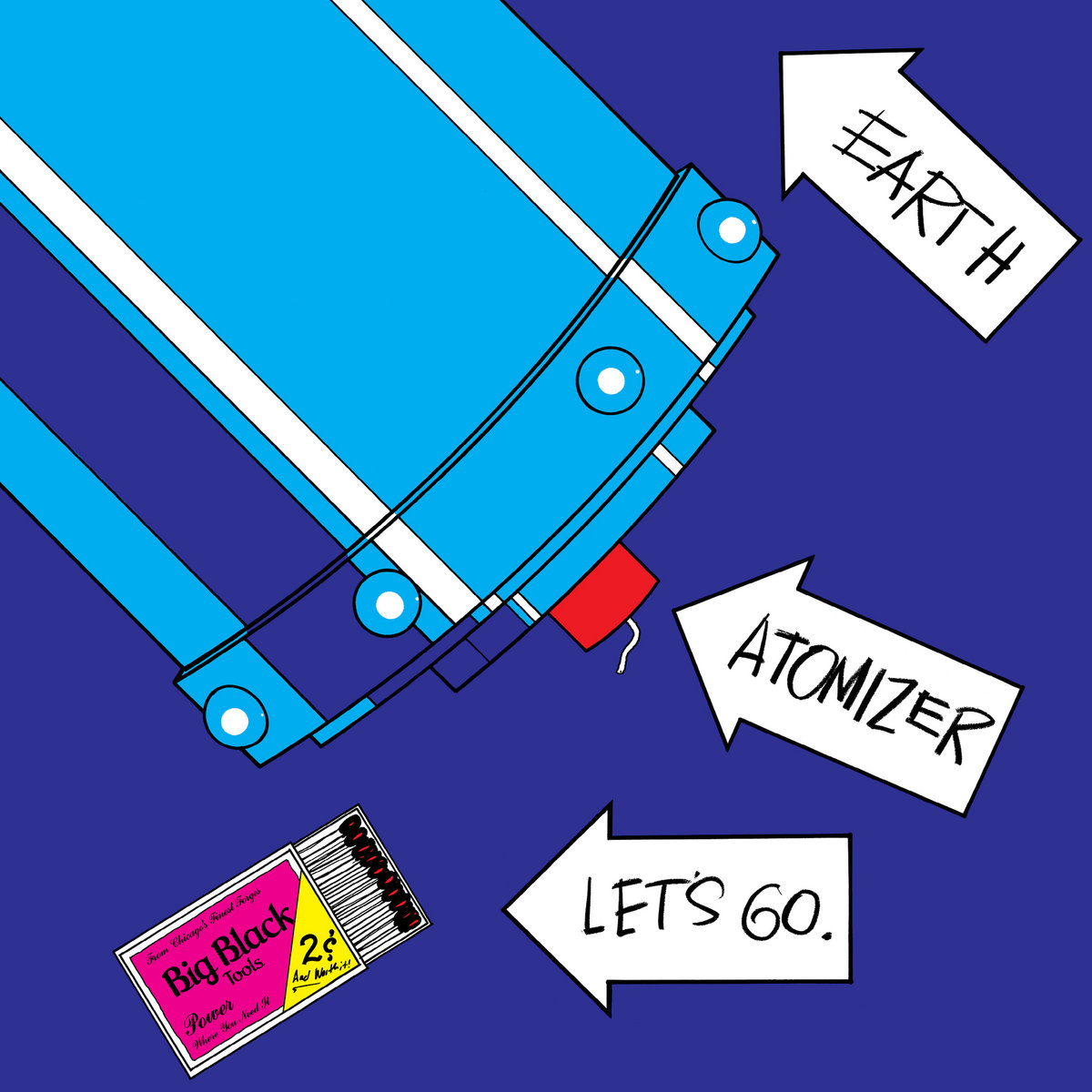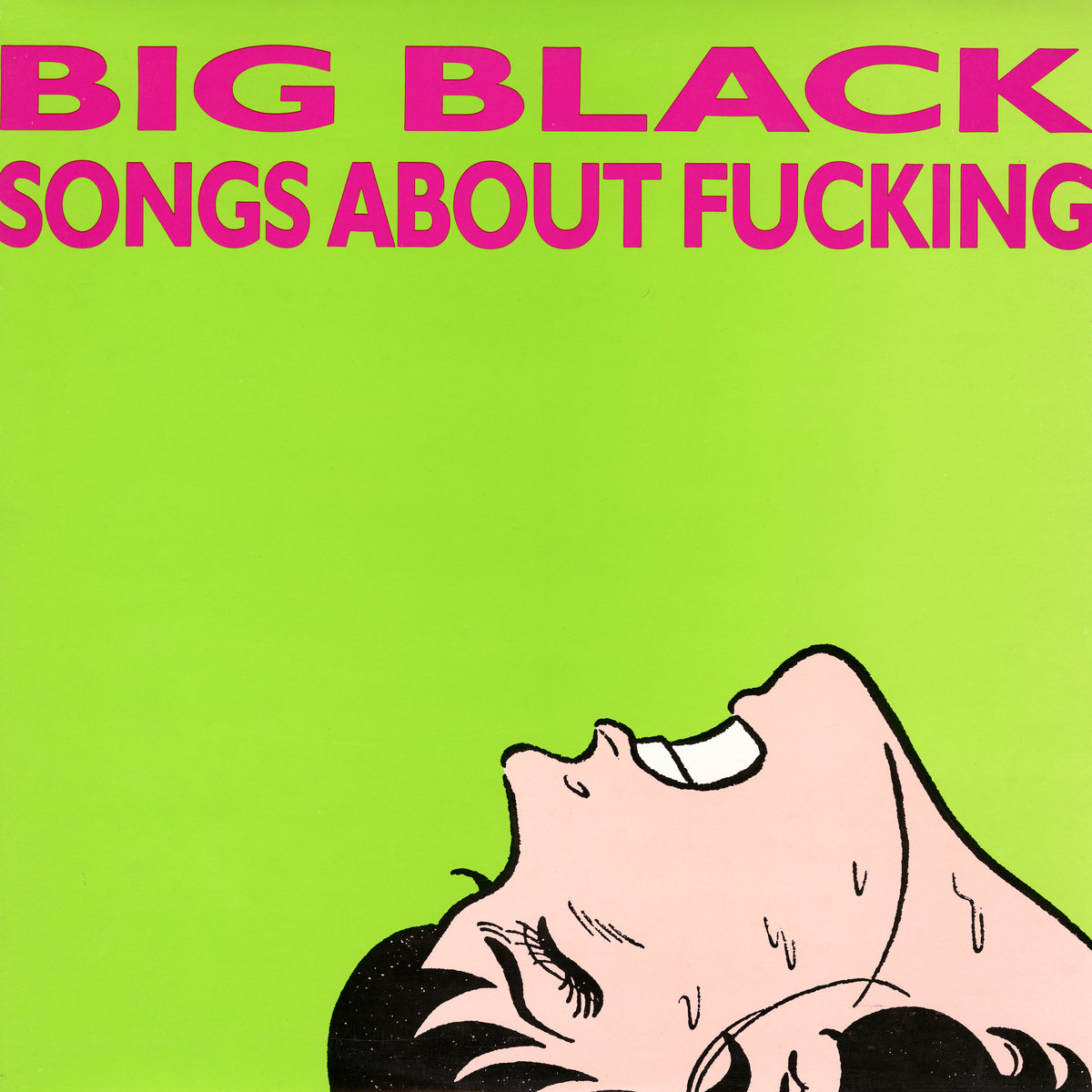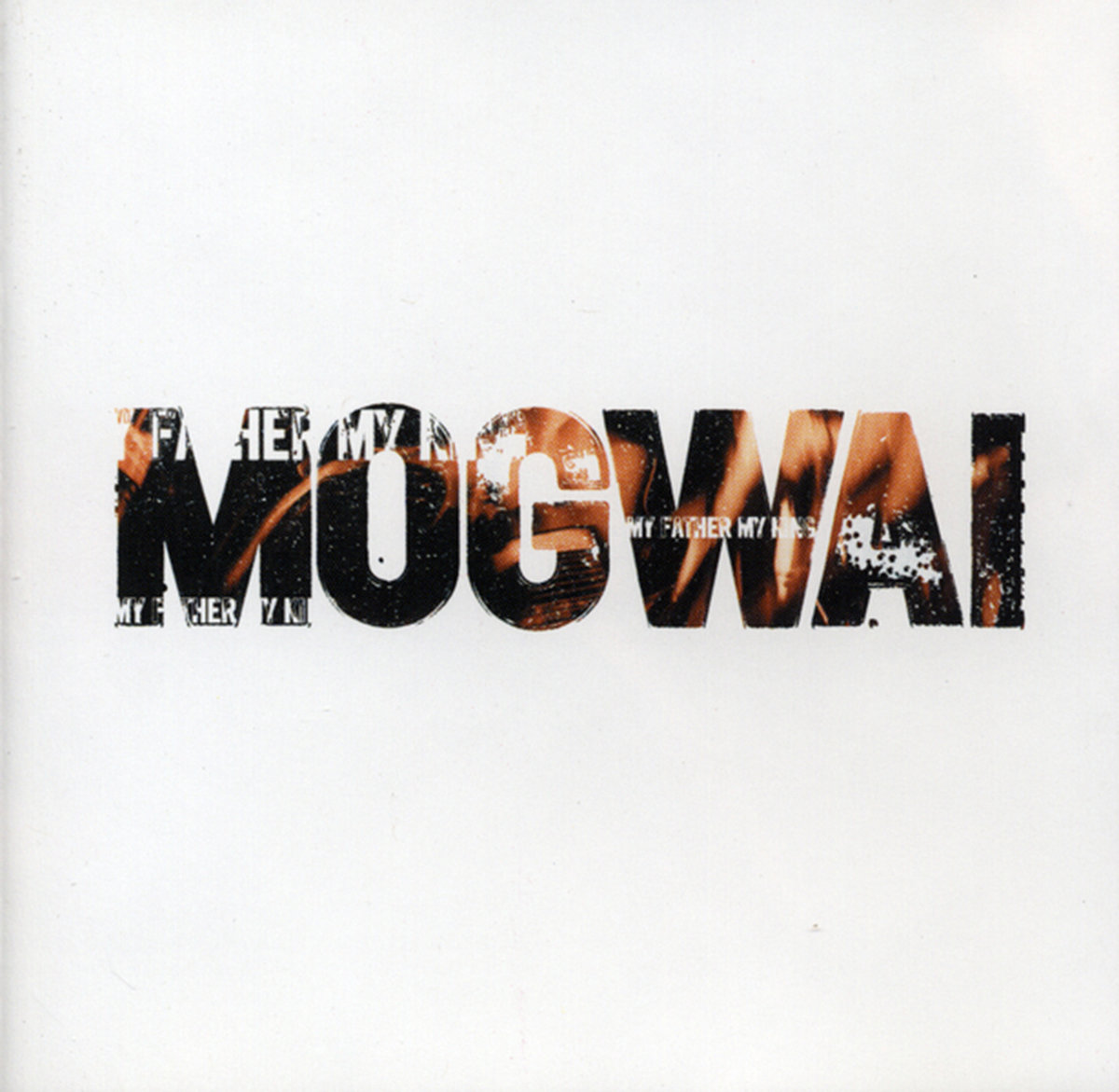Fuck all of this, I don’t want to have to write this – not today, not ever! To descend into this miserable and hokey rhythm of eulogising for this brute force of a man, but somehow we need to mark this tectonic shift and find some words for this godawful state.
Steve Albini is gone. We lost our good conscience. The gunslinger, the poker player, the sound of drums, the engineer of a thousand works. A man so goddamn stubborn, and so goddamn necessary in the thoroughly industrialised muck of music business. A prankster, an anarchist, a violator. Teller of truths, poet of bleach and mud and cobbled earth.
I love Steve, because he’s kind of like me: a non-conformist, a provocateur, a punk. A little loud and a little confrontative, unbuckling in the face of institutions, giving things away for free because he knows it’s the right thing, and if he’s not doing it – who else would? Slinging his guitar around his waist, not shoulder. Looking like a skinny nerd with his glasses and hat, but hammering his fingers against the strings until blood spills on his clothes – the sound of a wounded machine animal howling, chromatically, before he decides to chuck some firecrackers into the front row. His embodiment of a particularly broken and bent American Midwestern punk was meant to be as indigestible as possible, but within was the stature of lone rider, anti-hero, who stood against the forces of evil and oppression. Making jokes about fucking in the face of censorship. I love Steve cause he’s uncompromising, his edge an extension of his soul, a spirit.
A working man avantgarde punk, he played in Big Black, in Rapeman, in Shellac! Bands that were loud and shrill, at times scary, rubbing America’s vomit back into its faces. He self-produced those albums, followed a strict ethos and sound-philosophy: the vocals pushed back, the drums thundering and somewhat distant, the guitars crisp and cutting. It attracted other minds and voices – with each new name, things got a little bigger, his circle a little wider, the responses more resounding. Slint, Pixies, The Jesus Lizard, Breeders, The Wedding Present, Jon Spencer, PJ Harvey, Nirvana… that one hit big! He became the King of the Underground, the weirdo producer who would place a dozen microphones around the studio, some lying on the floor, others put in metal buckets. He preferred to be titled “engineer”. He built a studio – Electrical Audio – in 1997, in his hometown of Chicago, and would record pretty much anyone who asked him, always for the same price.
When he delivered In Utero, the major label was so ruffled by the record’s grim and authentic sound, it remixed it – and Albini ran into trouble securing jobs in the mainstream. But steadily, more and more idiosyncratic musicians would come to seek his ears and hands to guide their visions. Low, Neurosis, Whitehouse, Joanna Newsom, Manic Street Preachers, Mclusky, The Ex, Songs: Ohia, The Stooges, Nina Nastasia, Jarvis Cocker, Will Oldham, Sunn O))), Liturgy, even the AOR legends Cheap Trick! The works he has cut, just as the works that he inspired, are invaluable.
When Steve didn’t record he played poker, winning the World Series twice. He played and recorded with Shellac, and was just about to start touring their first album in a decade, which is slated for release the week after his passing. And he would speak, eloquently, on the oppressive nature of the music business industrial complex, which bled creatives dry and cannibalised their workers for capital that artists would never see.
He was also really fucking funny on Twitter, one of the most approachable and consistently friendliest Gen X figures. His interviews were always enlightening and invigorating.
He would probably shake his head at most of this, finding it pompous, but by god, what a great fucking person and artist, what an absolute tragedy that I have to write this when he hadn’t even finished being on this planet for 62 years. Still, we all owe him. And we, still, need him, the gunslinger, the anti-hero, the anarchist.
In his memory, we have decided to collect some of our favourite songs he recorded, created, moulded, but this is by no means a definitive selection. We are in shock, because really, he was the heart of the underground. Poetry of corrosion, lullabies of acid! One of the last figures of genuine American counter-culture, the sole alternative to Alternative. Goodbye, Steve. We are in your debt. – John Wohlmacher
You can find BPM’s We’ll be lucky if I don’t bust out crying: The Albini memorial playlist on Spotify or on Apple Music.

Big Black – “Jordan, Minnesota”
[from Atomizer, 1986]
An absolutely insane song, and one that can’t be left out of an Albini canon, “Jordan, Minnesota” is living evidence of the man’s early ambition to become some sort of punk rock Georges Bataille (too little scatology for De Sade in his work). An utterly brutal, libidinal track, it presents Albini’s protagonist as a violator, the type found in Throbbing Gristle and Whitehouse songs, some pervert dude from a bumfuck Midwestern town – genuinely evil.
Albini is doing a put-on, of course, intentionally provoking his audience into a perspective that the mainstream media and radio would never dare to investigate, exploitation hidden under the veil of picket fences and conservative facade. Blue Velvet, but snuff. It’s the type of thing so many of his proteges, the bands he would engineer, would parade out into the open, smearing the hypocrisy of American exceptionalism back into the culture’s face.
Musically, with its breakneck drum machine beat, the track almost feels like a possessed take on a Suicide song, infused with the same type of satanist machismo Rev and Vega managed to conjure. But it all explodes in the coda, convulsing over and over again like a dying monster, with Albini sounding as if he’s possessed, crying out in a high pitch, panting, a demonic force that just won’t die. It’s a traumatising listen, awesome in its ghoulish energy that renders the unmentionable in grim, prosaic banality, the three string players clanging like a cannibalising machine. It doesn’t get any darker than this, or frightening. Albini outgrew the provocations, publicly denouncing the alt-right playbook and dismissing his youthful arrogance as boundary pushing, but by god – what a gut-churning listen! – John Wohlmacher

Big Black – “Kerosene”
[from Atomizer, 1986]
“I was born in this town…”
Punk rock never sounded more caustic and unforgiving than on “Kerosene”, and likely never will again. Listening to this is akin to being tossed from a helicopter into a jungle entirely made of barbed wire, broken glass and corroded steel. Or, alternately, the bedrock of Montana. “Kerosene” is small town nihilism purer than nectar itself – even the most zen soul would be compelled to destroy a piece of public property when met with Albini’s unrelenting barrages of noise.
The song is both a blunt object of mass destruction and one of the sharpest, most vivid portrayals of American life on the fringes recorded to tape. The sheer dread is actually felt the most when the commotion simmers down – once that super shredder of a bassline, courtesy of Dave Riley, introduces itself. The drum computer – with the snare programmed at the start – acts as some sort of cruel time loop Albini’s protagonist is forever stuck in. “Stare at the walls / Stare at each other / Wait till we die,” he snarls.
It’s quite a funny lyric when you consider Albini’s immense body of work as a producer – wait, sorry – engineer and recording artist, and becoming one of the most hard working and well-traveled figures in rock music. The walls of Electrical Audio became sacred ground for artists who had something to do that didn’t quite involve the act of self-immolation described in “Kerosene”. That being said, PJ Harvey did actually set Albini on fire when recording Rid Of Me. – Jasper Willems

Big Black – “L Dopa”
[from Songs About Fucking, 1987]
By the time Big Black were recording Songs About Fucking, they knew it was going to be their epitaph. That only seemed to push them to write more depraved and unsettling songs and, of course, cap it off with that title and cover. Steve Albini’s stories were as economically savage as ever, with “L Dopa” standing as a prime example.
For this one, the singer was inspired by a story from Oliver Sacks’ book Awakenings about a woman who went into a coma at 21 and woke up 40 years thanks to the titular drug. Over a pummelling beat and razor-edged guitar jangle, Albini gives us a quick glimpse of a young woman as prom queen, before suddenly waking up only to realise she’s old and wrinkled, the world she knew all gone. “I’m a horror” Albini-as-coma-survivor announces, shortly before finishing off the song with a deranged, extended shriek, fully embodying the stomach churning reality of what’s happened to her. For the listener, there is no time to stop and take onboard the terror – the song is done in a landslide 100 seconds. – Rob Hakimian

Pixies – “Gigantic”
[from Surfer Rosa, 1988]
It’s impossible to overstate how important Surfer Rosa really is. Released in 1988, it significantly inspired David Bowie’s chromatic noise rock band Tin Machine, expanded Kurt Cobain’s creative palette and ultimately shifted his focus to record In Utero in the same ragged style and, years later, even found its way into the mainstream via “Where is My Mind” being included in Fight Club.
A strange cult punk standout, it sounds both rambunctious and solemn – most people will think it’s somehow mixed wrong upon first listen, as the loud/quiet dynamics of it are so incredibly off the charts. Perfect case to prove this point is the incredible “Gigantic”.
Moving all the equipment to a studio bathroom, the track features a clean and clear vocal from Kim Deal over a bass line and solemn percussion. On the bridge, the song suddenly explodes into drums and a shrieking guitar, and explodes into a muscular riff for the chorus, with Deal shouting out the song’s title. It’s an incredible performance from the charismatic bassist and co-lead, but the star of the show are the drums: they echo and pound over the rest of the mix, like a lumbering giant. Considering the song is actually inspired by the movie Crimes of the Heart, and describes a woman observing mixed-race sex, the especially loud drum mix could be seen as an intentionally ironic play of Albini with the risky topic. A hidden joke for the coming nerds to decipher? Would be very much up his alley to giggle at something so goofy! He made the song so sonically bipolar, 4AD head Ivo Watts-Russell hired Gil Norton to re-record it for an eventual single release, starting what would become the well trodden tradition of Steve Albini making seasoned label heads sweat. – John Wohlmacher

The Jesus Lizard – “Mouth Breather”
[from Goat, 1991]
“Don’t get me wrong, he’s a nice guy / I like him just fine / But he’s a mouth breather”
The mouth breather in question is Britt Walford, drummer for Slint and in the words of The Jesus Lizard’s David Yow “…an idiot savant genius freak guy.”
So, the story goes that Albini tells Yow about the time he had to go out of town and he let Wallford house-sit for him. Hindsight is a wonderful thing. Keys are lost, the front door is ripped off its hinges, adequate repair work is not carried out. Worse follows. Somehow, Walford manages to break the toilet which leads to Albini’s basement being flooded. This is where his recording studio is located, years before Electrical Audio opens. All of this, and Albini still has the magnanimity to seemingly shrug it off as if it’s no big deal. Oh, and the line at the end about finding the house-sitting friend deceased? A fictional fabrication. Walford is alive and as well as can be reasonably expected for a mouth breather.
Albini was the obvious audio engineer for The Jesus Lizard. Formed in Austin, Texas in 1987 they moved to Chicago two years later and worked with Albini on their first EP and the first four of their five albums. Acerbic yet personable, harsh but exuding charm – Albini and The Jesus Lizard shared the same traits, all undercut with an energy and humour that makes the marriage of the two such a delight. This is a gift. – Todd Dedman

PJ Harvey – “Rid Of Me”
[from Rid Of Me, 1993]
Steve Albini had unparalleled range as an audio engineer, capable of creating both loud, expansive rock masterpieces (Nirvana’s In Utero, Songs:Ohia’s “Farewell Transmission”) and moments of sparse, quiet intimacy (Low’s “I Remember”, Magnolia Electric Co’s “Hammer Down”).
On “Rid of Me” he communicated the extent of his unrivalled versatility in just four-and-a-half minutes. For two minutes and 10 seconds, the song simmers carefully; just palm-muted electric guitar strumming and PJ Harvey’s passionate, hungry voice pushed back in the mix. Then, seemingly out of nowhere, the song explodes into a loud-quiet indie-rock epic; capturing the stir-crazy intensity of desire. Thirty-one years later, the song remains a crowning achievement in a career full of triumphs, for both Harvey and Albini. – Tom Williams

Nirvana – “Heart Shaped Box” (Original Steve Albini Mix)
[from In Utero, 1993]
It’s amazing to revisit the pieces written to commemorate the 10th anniversary of In Utero. Steve Albini is – of course – interviewed, and often depicted as this weird, grumpy dude who’s somewhat mystical but also seems really pissed off, with him even forgetting the name of “Milk It”. Maybe that was an act, but it makes sense that Albini was kind of torn on In Utero, a fantastic record by a great band that he would just consider another great record from a good band he helped record, featuring the guy whom the industry drove to his death.
It also might have cemented his hatred for the major label industrial complex, who returned to the tapes and had “Heart Shaped Box” redone by Scott Lit so it would fit radio play standards. His original mix – which first appeared mysteriously on a German vinyl edition and then later in various Deluxe Editions – has more thundering drums, and – most notably – a mean, crackling effect on Cobain’s solo that would ultimately become the focal point of Geffen’s issue with Albini’s job.
What’s lesser known is that bassist Krist Novoselic also disapproved of the choice, debating the effect’s inclusion during the sessions, with Kurt and Steve just shrugging him off. Of course that wouldn’t be Albini’s last word: for his 2013 remix of the album, he removed the effect, tinkered with the loudness dynamics throughout and upped the cymbals. Of course it’s blasphemy, to precisely restore the point of contention to then finally make the mix even more overtly violently. You just got to give it to Albini – the guy knew how to deconstruct rock mythologies! – John Wohlmacher

Dianogah – “At The Mercy of the Mustang”
[from Battle Champions, 2000]
Albini was admired internationally for his refusal to play the record-industry game of sticking his hand in artists’ pockets. In Chicago, he was renowned for – well, his attitude, for one. A journalism major, his flame war with the Chicago Reader over Smashing Pumpkins, Urge Overkill and Liz Phair (“Three Pandering Sluts And Their Music Press Stooge”) remains a vibrant piece of local lore. He never granted an interview to the Illinois Entertainer, even as part of a tribute article about his close friend Corey Rusk of Touch And Go Records. More recently, he took some bait and slammed Frank Turner: “Everything you’ve said to me makes me think I want this guy to jump in [a] well.” (For the record, Turner’s response to Albini’s death was “medium gutted”.)
For generations of Chicago artists, however, Albini and Electrical Audio were sacred (and had an unbelievable collection of gear for anyone to use). Whether you worked with Albini and Greg Norman or not, it wasn’t enough to dent the experience of being behind the curtain. Dianogah was a belt-and-suspenders staple of Windy City post rock that – in Albini’s hands – nevertheless sounds like all those tones from The Wedding Present to Jesus Lizard to Slint to Shannon Wright on down. “At The Mercy Of The Mustang” placed them in the company of giants. – Steve Forstneger

Shellac – “Prayer To God”
[from 1000 Hurts, 2000]
Throughout his career as front man, Albini found it easy to take on the role of complete douchebag – sometimes deranged, sometimes oversexual, sometimes aggressive. “Prayer To God” is a bit of all of that, and stands as his best take down of impotent male rage – while also being totally relatable to most straight men.
Break ups are hard – and if you don’t take it well then any news of your ex-girlfriend moving on is going to inspire pangs of rage and jealousy. We might even, in our darkest moments, wish some ill fate befall the former partner and their new plaything. But, hopefully for most, that passes in a few seconds.
However, Albini’s character in “Prayer To God” leans into the hatred, the entitlement and bloodlust. What starts as a simple clasped-hands prayer quickly descends into spitting impatience; “kill him / fucking kill him / kill him already kill him,” he repeats throughout the song’s second half, the band backing up his bile with ever more savage stabs. The noise seems to propel his rage into darker places, desiring the man to be embarrassed as he weeps for his life. Each frenetic lash of drums and guitar sounds like the blade plunging in and out of the wrongdoer’s chest, Albini practically spitting as he drools over the imagined image. – Rob Hakimian

Low – “Laser Beam”
[from Things We Lost In The Fire, 2001]
Oh, man. If this isn’t one of the most gorgeous recordings of all time of one of the most gorgeous songs of all time then I really don’t need to know what is, as it would be entirely beyond my emotional capacity. I’ve struggled to listen to this song since Mimi Parker’s untimely death in 2022, so listening to it now in a post-Albini world feels just that little bit more of a challenge.
It’s as perfect as you can get, due largely to the “flaws” being left in. Mimi’s achingly beautiful voice is captured with a warm vulnerability, yet at 57 seconds in there’s a slight clipping on the vocal which (a) shows how hard Albini was pushing the intimacy with mic placement, but more importantly (b) shows his skill at revealing the humanity of the artist despite the techniques and veils available in the recording process. Guitar fret scratches are left in, as are the almost imperceptible yet crucial intakes of breaths between lines. Herein lies the genius of Albini and his desire to extract a performance that is absolutely nothing if it isn’t authentic. – Todd Dedman

Low – “In Metal”
[from Things We Lost In The Fire, 2001]
Many of the best songs from slowcore giants Low played with our perceptions of time and memory; backdropping allusive, sensory imagery with a mellow, subdued soundscape that had the effect of making time sound as though it was collapsing in on itself.
On “In Metal”, Albini subtly sharpened and refined the band’s sound without detracting from the their signature strange, distorted beauty. Across “In Metal”’s almost four and a half minutes, the late Mimi Parker sang of wanting her new baby, Hollis, to stay small forever (“Partly hate to see you grow / And just like your baby shoes / Wish I could keep your little body / In metal”). Albini knew exactly how to best complement Parker’s sentiment of longing, keeping things sparse and simple while Parker sang, before giving way to a dreamy instrumental passage shortly after the halfway point. The end result was one of Low’s most transfixing, moving and nakedly vulnerable additions to their discography. – Tom Williams

Mogwai – “My Father, My King”
[from My Father, My King, 2001]
Based on a Jewish hymn, this 20-minute epic emphasises Albini’s power as an engineer when compared to Mogwai’s other recorded output of the time. “My Father My King” feels like a return to early Mogwai, when they were both abrasive and beautiful.
The track is often seen as a companion piece to the Dave Fridmann produced Rock Action, but this track is far superior in every respect. Where the album is one to wallow in as its general aesthetic is lush and mellow, the burst of energy around the midway point of “My Father My King” elevates the listener and the song just cranks up and up from there. The mix is masterful. Just as you think we’re at maximum, there’s space for more. Melodies persist, and somehow Albini finds the frequencies to just keep adding layer after layer until you get to the 13:22 mark and you realise he’s just taking the absolute piss out of the process. The guitar sound there just feels impossible, but it doesn’t even stop there. A joyous ride of a masterpiece. – Todd Dedman

Nina Nastasia – “Ocean”
[from The Blackened Air, 2002]
In a tweet from September 2023, Albini posted a list of “20 songs I like.” “Tried not to include any I worked on,” he wrote, “but made an exception for Nina.”
Towards the bottom of the list is the gothic string-backed folk rock of Nina Nastasia’s “This is What It Is”, a dramatic, propulsive song from her second LP, The Blackened Air. Albini worked on every one of the songwriter’s albums, including her comeback album Riderless Horse from 2023. It was a profoundly difficult album to make emotionally, but she said that Albini (engineer and co-producer) provided her the exact right environment to record such tough songs.
Nastasia and Albini were never one of his most famous or even more likely pairings, but they seem to be one he held very dear. Later on The Blackened Air, we get one Nastasia’s biggest songs, “Ocean”. It begins with an upright bass line plucked so quietly it’s tricky to hear at low volumes, then there’s a few seconds of total silence, and it’s then that her guitar progression come out, tiptoeing like a scared child. “You’re talking and waiting for me / You’re getting much smaller as you speak” she sings, in her ominous middle register.
Then, a classic Albini move on a decidedly un-classic Albini recording. Nastasia sings “I’m 40 stories high”, and then — boom — an explosion of sound. Walls of strings, crashing drums, mightily strummed guitar, and her voice growing in intensity to stay heard — a quiet-loud dynamic we see across Albini’s repertoire, lent to a woman whose music is usually rather quiet and placid.
After a brief, whisper-quiet bridge where Nastasia sings “I died right in the ocean / I died just like a whale”, the drama returns, with a particularly raging fiddle (I think?) whizzing atop it all — a dark storm to close us out. At six minutes, it remains Nastasia’s longest song, and a real testament to the work the close friends made over her entire career. Albini may have been more known for more gnarly and rocking projects, but he always made space for Nina Nastasia, and the tender care put into producing her songs with such a textured immediacy shines through time and time again. – Jeremy J. Fisette

Godspeed You! Black Emperor – “motherfucker=redeemer”
[from Yanqui U.X.O., 2002]
Confession time. When Yanqui U.X.O. came out in 2002 I genuinely thought Albini had ruined one of my favourite bands. Back then, the mix sounded off, the guitars were too thin sounding, every instrument seemed to be jostling for space rather than being allowed to breathe like on their previous records. And what the hell was going on with the drums?? This is Albini – King of the Drum Sound. Turns out I was very wrong. Took me about a decade for the album to click in the way that every new GY!BE record had before and since. After all, what’s the point in getting Albini to record your band if you’re just going to end up with a record that sounds like your others?
“motherfucker=redeemer” (in its complete form) is half an hour of pensive, life-affirming post-rock that, despite its run time, still feels like it could be longer. It’s full of verve and swagger that really needs the listener to be attentive to pick out all of the constituent elements at work, it isn’t going to let you be lazy and just absorb the track. This is a relational dynamic between band and listener that has been set up as a result of the recording processes. Godspeed You! Black Emperor are an overtly political band, and the recording now no longer feels lacking as it once did, it’s relevant to the objectives of the artists and their worldview. It’s perfect, and I was wrong. Laugh it up, fuzzball. – Todd Dedman

Songs: Ohia – “Farewell Transmission”
[from Magnolia Electric Co., 2003]
Twelve musicians together in a room with no real plan, and just like that, one of the greatest songs ever written is captured on tape… on the first time it was ever played.
Many songs Albini recorded over the decades serve as worthy eulogies, but “Farewell Transmission” poignantly summarizes what made Albini such a singular presence. The man never was much of a romantic – he always illustrated his craft with the matter-of-factness of someone doing 9-to-5 manual labor (he told Nirvana in a letter that he wished to be “paid like a plumber” if he were to produce In Utero – which he eventually did).
But he listened, and he always bent over backwards to capture the individual voice of the artists inside of a room – and to eliminate any factors that would disturb this process. And by doing so, embracing all the variables that come with it. Steve Albini has done so during his 61 years among the living, over a thousand times, each and every day. A selfless vocation Jason Molina’s urgent voice captures out of thin air:
“Through the static and distance
Long dark blues
A farewell transmission
Long dark blues
Listen”
– Jasper Willems

Songs: Ohia – “John Henry Split My Heart”
[from Magnolia Electric Co., 2003]
Listening to The Magnolia Electric Co. in sequence (as is only right), “John Henry Split My Heart” follows on from two songs in which Jason Molina hands over vocal duties to guests. But with those out of the way, the Songs: Ohia man re-takes the spotlight in magnificent fashion, Albini ensuring that the band sounds sumptuous as earth shaking piano and guitar cuts across the peace, kicking up a torrent of dust, setting the scene for Molina in epic fashion: “I stood on the 66 highway”.
As it does across the whole album, the decision to record the band live pays off massively on “John Henry Split My Heart”. Molina writes the famous folklore character John Henry into his own American epic, traversing the country, standing on mountains under a “full moon heart”, getting lost in the “long dark blues” over which a “big star is falling”. The playing is scorching and enormous in the recording, blowing up the imagery into a true tall tale of wonder. – Rob Hakimian

Joanna Newsom – “Sawdust & Diamonds”
[from Ys, 2006]
Joanna Newsom’s second album, the magnificent Ys, may be, first and foremost, a collaboration with famed composer Van Dyke Parks, but it had a sort of secret weapon in Steve Albini. Parks lent luminous, dense, complicated, and deeply memorable full-orchestra compositions to four of the album’s five epic songs, but Albini is the one who recorded Newsom’s original harp and voice tracks. And at the record’s heart lies its one solo harp piece, “Sawdust & Diamonds”.
Starting off with heavy, plodding chords, swimming in natural space, the song quickly picks up momentum, with Newsom’s intricately plucked harp progression, fluttering with the grace and ease of a hummingbird’s wings. Her lyrics and melodies spill out like a babbling brook, winding and circuitous, but never losing their way.
There are so many astonishing lyrical and melodic moments on this song you could pick one out of nearly every line, and fill a whole page with just these. But the production on the song is equally as important. This song feels especially out of place with most of Albini’s output, but he gives Newsom’s work the sense of space and warmth it needs. At nearly 10 minutes, the song is much starker and more minimal — and yet, more direct — than basically anything else on Ys, and it took a hand as assured as Albini’s to keep it clear, coherent, with the perfectly small dose of reverb, and a shockingly full mix. You feel like you’re in the room with her, and that’s one of Albini’s best and most easily-understated tricks: he really knew how to make a record sound like someone making a record. It sounds simplistic on paper, but it’s a difficult feat, and Albini did it throughout his career. He brought Newsom’s allegory- and imagery-laden tale to vivid, complex life.
At her recent show at Kilby Block Party in Utah, Newsom played this song and “Cosmia” (also from Ys) and dedicated them to Albini, whom she said she loved so much she hasn’t fully accepted that he’s gone yet. She also said that any music-related reasons wouldn’t have even cracked the top 10 of reasons she loved him. And given how incredible songs like “Sawdust & Diamonds” sound, that should tell you something about the man behind the boards. – Jeremy J. Fisette

Magnolia Electric Co. – “Hammer Down”
[from Sojourner, 2007]
In regards to his numerous, fruitful, multiple alias-spanning collaborations with the late Jason Molina, Steve Albini is best known for his work on 2003’s Magnolia Electric Co – a devastating alt-country epic that frequently nears stadium sized proportions.
But Albini also understood that sometimes less was more for the sensitive singer-songwriter. “Hammer Down” was written and released at the same time as the demons that would ultimately cause Molina’s untimely demise were beginning to catch up to him. On “Hammer Down”, Molina stared down at the void, and the ever-attuned Albini offered him a suitably sparse soundscape to backdrop his woes.
“Sometimes I forget how I’ve always been sick / And I don’t have the will to keep fighting it”, confessed Molina, who would die six years later from multiple organ failure caused by alcoholism. Singing over nothing more than sparsely strummed acoustic guitar and muted drum thuds, Molina sounded terrifyingly alone at the mic. Albini made sure to leave listeners with no space to run away from the song’s intensity. – Tom Williams

Scout Niblett – “Just Do It!”
[from The Calcination of Scout Niblett, 2010]
Even though Albini produced all of Scout Niblett’s records (except her last one in 2013), her 2010 album The Calcination of Scout Niblett was sort of unlike anything she had done before. Previously, her work mostly operated within the folk rock genre, though it was often besotted with electric guitar squalls. But on Calcination, she took that side of her music to a new degree, and its opener “Just Do It!” is a perfect example.
A stormy, squealing electric guitar salvo opens things up, before quieting down for a tamer middle section. Niblett’s favored mode of laying a melody over a cyclical, repetitious guitar figure — that ramps up tension despite nary a shift in energy or volume — is front and center here, with Albini’s masterful way of creating a sense of space and place on full display.
It’s a pretty sedate song, in all honesty, but it’s bookended by two deeply fiery, wiry guitar passages. It’s brittle, spare, minimalistic — all the things Albini was so adept at capturing in bigger, noisier bands. But here, with just her weary voice and wild guitar (not even drums, which is a rarity for Niblett, who also loves when she can get her hands on a banging, booming drum) Albini harnessed it in a way befitting of the album’s title — this song, and so many others the two worked on over the years (check out “Drummer Boy” or “Nevada” for further proof), show what a careful ear it takes to tame the maelstroms Niblett was so skilled at conjuring. – Jeremy J. Fisette

P.K. 14 – “航行者” (“Voyager”)
[from 1984, 2013]
P.K. 14 may be legends in their own Beijing rock scene – they damn well are, assurances – but the likelihood of their music even finding the ears of most big name Western producers, let alone one of them opting to actually work with them? Slim to none.
1984 may be far from the most known of Albini’s studio collaborations, but few better represent everything he stood for. Speaking on the legend’s passing, their label’s owner reflected, “I’ll always be grateful that he was willing to produce one of the best Chinese bands on my label for the very modest fee they could afford.” Needless to say, that’s very much Steve for ya.
Of course, P.K. 14 are no slouches, and relish the opportunity by ripping through a vicious interpretation of George Orwell’s literary world, with Albini knowing just how to capture the whole thing. It’s crisp. It’s loud. It’s impossible to choose the best cut, but “航行者” calls back to early Modest Mouse, feeling like something the band might have cut for Long Drive had they hailed from Beijing rather than than the Midwest. No other producer would have given these cutting, homegrown jams the urgency and palpable ‘you’re right there in the room’ feeling they have. It’s high time more folk rejoice at yet another moment in an all timer level career that feels so damn lucky to have happened at all. – Chase McMullen

Sunn O))) – “Between Sleipnir’s Breaths”
[from Life Metal, 2019]
“Sure, this will be fun. I have no idea what is going to happen…” – the words of Albini on the phone to an apparently nervous Stephen O’Malley when called to ask if he would record Sunn O)))’s eighth studio album. From the press shots of the recording sessions, and photos shared by O’Malley and Greg Anderson in the last few days since Albini has gone, it does look like they had a whole heap of fun making Life Metal, even if that isn’t the first word that comes to mind when thinking about Sunn O))). There’s also a really blissful and bright element to the record which is largely due to O’Malley and Anderson being in good places in their personal lives.
This is the band’s first purely analogue release – Albini’s hatred for digital is well documented – and this approach adds a tonality to the pieces that are missing elsewhere. When it seeps through the fog of noise, Hildur Guðnadóttir’s voice is exquisite, stoic in delivery amidst the cacophony. There’s a binary at play between the harsh, yet optimistic instruments and the gorgeous but downbeat voice. This is the song people who think Sunn O))) are just some weird noise experiment should listen to in order to realise there’s grace and wonder in their work. – Todd Dedman

Liturgy – “Djennaration”
[from 93696, 2023]
Steve Albini, by his own account, was an atheist who “would put all [his] money on there not being anything other than this universe”. But even with his skepticism about faith and religion, Albini’s recording style, celebrated for its tangibility, profoundly shaped Liturgy’s 2023 album 93696. It is particularly on the track “Djennaration” that we see the divine aspects of Haela Ravenna Hunt-Hendrix’s music brought vividly to life.
Albini’s masterful touch complements Hunt-Hendrix’s deep theological explorations, elevating the divine dynamics of her vision to an immediate and tangible experience. Intricate layering of glitchy, dynamic beats and fierce guitar riffs come together with Hunt-Hendrix’s impassioned, drawn-out shills in a powerful mix that all but achieves the transcendental intentions of Liturgy.
As the track builds momentum until it can no longer, the spiritual is brought into direct proximity with the listener — it’s a sonic phenomenon that feels like a faith-altering glimpse of the sublime. Thanks to the icon’s skillful handling of these elements, the track’s raw and intense quality, which is, of course, inseparable from Albini’s style, ironically makes its spirituality feel as real and palpable as the physical world. – Kyle Kohner
Find the playlist on Spotify or Apple Music.

